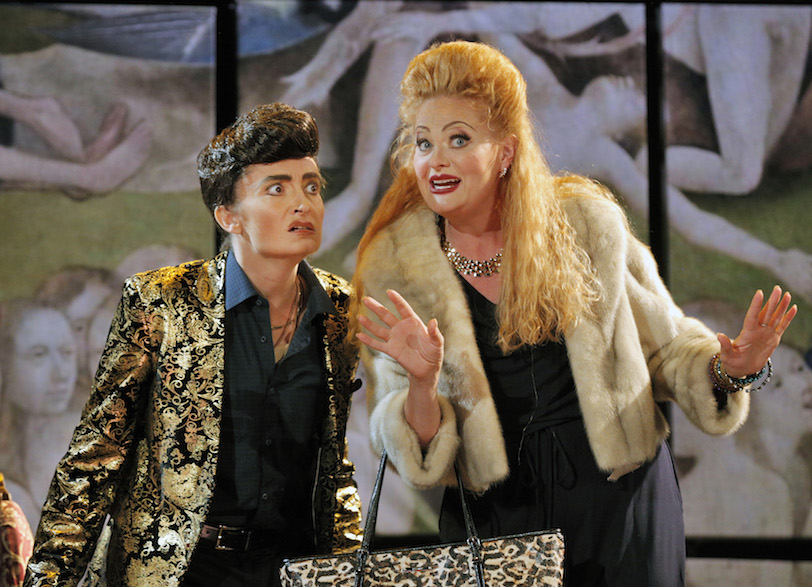The dark mysteries of connivance
These days it seems our most insightful investigative reporters and political analysts are comedians, from John Oliver to Trevor Noah. Could it be that the political posturings in the pursuit of the current presidency are too terrifying to examine, except through the lens of satire? There is too much that holds true in Stephen Colbert’s “Hungry for Power Games.” Following the trend, West Edge Opera’s last opera of the summer festival, Handel’s Agrippina, looks at the obsession for power with a similar, broadly cavorting satiric eye.
Handel’s opera is a study in the excesses of power, and like many portraits of the mid Roman Empire is rife with intrigue, albeit unreliably so. Most history presented on the operatic stage makes a better story than a truth telling. Historians and opera devotees agree on one thing, however: Agrippina was ruthlessly ambitious.
In the opera, Agrippina, sister of the late Emperor Caligula and the wife of the current Emperor Claudio, lusts for power, not for so much for herself, but for her mad son, Nero. When she hears that Claudio has drowned she moves to have Nero put on the throne, promising all things to all people for their support, especially to her devoted admirers, Pallante and Narciso. Claudio, however, lives, and has promised to name the soldier Ottone the next emperor in exchange for his having saved Claudio’s life. Ottone, who seems to be the one noble person in a cast of a thousand connivers, tells Agrippina that he is happy to give up the throne if only he can marry Poppea, who is currently the Emperor’s main lust kitten. And that’s just the start of the opera. It continues to grow more complicated as Agrippina uses her many wiles to make Nero Emperor.
The lithe beauty of music
The compact orchestra with Baroque instruments and using Baroque tuning was vivacious in its attack, led by Jory Vinikour from the harpsichord. The continuo as it so often is was lovely. Soprano Sarah Gartshore fizzed with comedy in the role of Agrippina, not only with her considerable vocal power and finesse but also in her theatrical good humor. A mad Agrippina she may have been, but also an entertaining one, delightfully reckless in her plotting. She was matched by Céline Ricci singing Nero, a part originally for soprano castrato. Dressed in a gold brocade jacket and a two-story-high brunette pompadour, she slid easily through the rising and falling ornamentation of the arias. And the insanity of her character, his lust for power and sex, was vividly revealed on her face and in her body’s movements.
Countertenor Ryan Belongie sang Ottone with a graceful innocence, his second-act aria especially moving. Hannah Stephens sang the demanding coloratura role of Poppea with a light and credible agility, and her Poppea was placed theatrically somewhere between Lolita and Tammy. Baritone Carl King sang an energetic and salivating Emperor Claudio. Nikolas Nackley was Pallante and mezzo Johanna Bronk Narciso.
Artistic Director Mark Steshinsky opted for over-the-top direction, and it certainly made for entertaining watching and listening, adding to the company’s reputation for the daring and the sexually outré. He also was behind the concept of the sets designed by Sarah Phykitt, which was a stage-size blow-up of Bosch’s “Garden of Earthly Delights” divided into smaller panels to create two walls, one set in the front of the stage and one upstage. Sublimely decorated with the dramatic, exotic and monstrous imaginings of the Netherlandish painter, the panels created a box of sorts, which actually helped to focus the sound of the singers in the otherwise large and open space of the abandoned Oakland train station. Although the station gets highest marks for ambience, it hasn’t the best acoustics. Nor the best sight lines. Fingers crossed that the city will feel encouraged to enhance the station’s amenities.
– Jaime Robles
Photo: Céline Ricci (Nero) and Sarah Gartshore (Agrippina) in the West Edge Opera productions.

